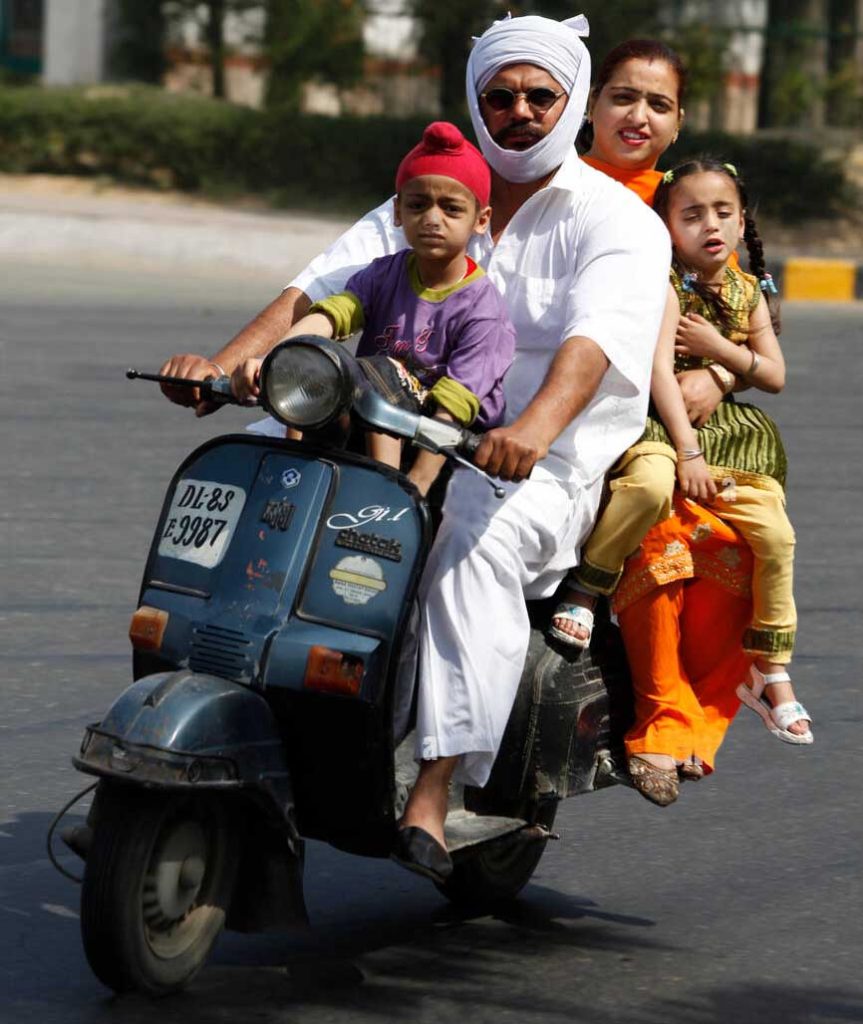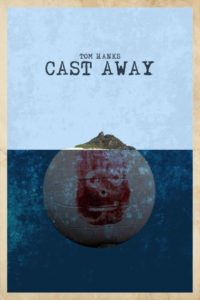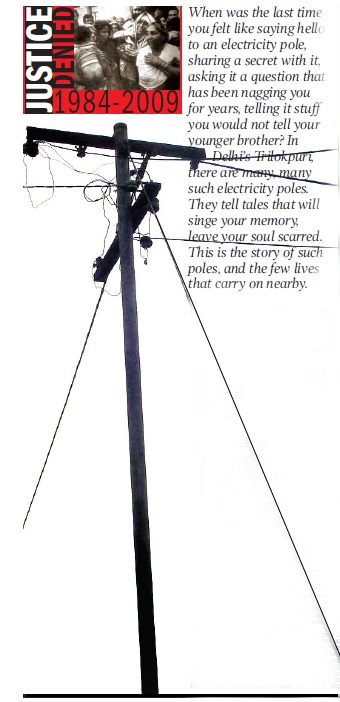Chunnu Munnu De Papa
A rather amusing but also poignant message posted by Senior Journalist SP Singh within minutes of the news about death of Indian auto industry baron Rahul Bajaj breaking elicited many a response in various social media groups. We took the liberty to ask SP Singh if we can share the message with our readers since it encapsulated multiple emotions. Now that we have his consent, we are taking the liberty and have also merged his counter-response to the feedback the original message received, since it also mentions a write up in the World Sikh News. It’s a love requiem for a scooter, a sort of Valentine’s Day elegy if there’s such a thing.– Ed, WSN
![A rather amusing but also poignant message posted by Senior Journalist SP Singh within minutes of the news about death of Indian auto industry baron Rahul Bajaj breaking elicited many a response in various social media groups. We took the liberty to ask SP Singh if we can share the message with our readers since it encapsulated multiple emotions. Now that we have his consent, we are taking the liberty and have also merged his counter-response to the feedback the […]](https://www.theworldsikhnews.com/wp-content/uploads/2022/02/Bajaj-slider-360x266.jpg)
IT WAS THE EARLY 90s. WE HAD PAID FOR IT, AND THOUGHT IT WAS “HAMARA BAJAJ.” I wanted to name it but was spoilt for choice – Sacagawea or Rocinante or Dapple.
I had already missed naming my bicycle La Poderosa (The Motorcycle Diaries came in 1995, the movie in 2004.) Friends protested against any foreign name, so we decided to call it Jamnalal.
The country was opening up. Scooters were now available on-demand, unlike the early 80s when we had to wait a couple of years even for a Luna.

The Stepney cover was all that they gave free with the Chetak. On it was emblazoned, “Chunnu-Munnu De Papa Di Gaddi,” complete with the picture of two little kids, one of them a cute Sikh with his hair tied up in a joora atop his head, covered with a hanky fastened with a scrunchy.

There was something about the Sardar kid – his beaming smile, some of his hair a little unkempt refusing to crawl under the scrunchy, and his eyes sparkling with some mischief! That look was the reason I decided to live with that Stepney cover.
 It was kind of my pix. Hardly any advertisements featured a Sardar in those days, except for “Sardar Di Shaan – Simco Fixer” and I had little use of the adhesive at the time, given the least noticeable side whiskers I yet had. So, I was alright with my scooter proclaiming to the town that it was “Chunnu-Munnu De Papa Di Gaddi” though it was my dad who had paid for it.
It was kind of my pix. Hardly any advertisements featured a Sardar in those days, except for “Sardar Di Shaan – Simco Fixer” and I had little use of the adhesive at the time, given the least noticeable side whiskers I yet had. So, I was alright with my scooter proclaiming to the town that it was “Chunnu-Munnu De Papa Di Gaddi” though it was my dad who had paid for it.
Over the years, Jamnalal became a family member. It went with me to the office, friends’ homes, parties. On tough days, there’ll be just the two of us at the Lodhi Gardens or in Mehrauli.
Over the last three decades, the world changed. Jamnalal grew old, and then rested/rusted.
For about two decades now, the scooter’s been gathering dust downstairs. Matter of fact, it’s been junk for these two decades. It’s there ‘coz I just couldn’t muster up the heart to ask the scrap fellow to take it away! The Stepney cover had lasted just a few months, and the scooter a decade more. Somehow, I neglected to find out all these years which of Rahul Bajaj’s sons were named like that: whether Rajiv is Chunnu and Sanjiv is Munnu or vice versa?
Chunnu-Munnu De Papa passed away today.
Do you think I should go condole, pat the torn seat cover, run my hand over the handle and whisper to Jamnalal, “It’s okay!” or a Chetak is too brave to need commiseration?
_________
Jamnalal, the scooter; Fikr Taunsvi & the Electricity Pole – Is it all just Stuff?
Some of the friends have commented how objects could come to mean a lot more than what they are. Someone not really known to me but who is in my phone’s contact list has written: “That scooter isn’t junk. That is a pile of memories.” The name under which this contact’s number is saved doesn’t even reveal if it’s a he or a she. And yet, it feels as if this person knows Jamnalal so well, has got it absolutely right.
Objects are strange things.
Scholar and author Harpal Singh Pannu has narrated a chuckle-worthy anecdote. Here it is – “ਫਿਕਰ ਤੌਂਸਵੀ ਦਾ ਅਪਣੇ ਅੱਬੂ ਦੇ ਸਾਈਕਲ ਵਾਲਾ ਬਿਰਤਾਂਤ ਸਾਕਾਰ ਹੋ ਗਿਆ। ਬਕੌਲ ਫਿਕਰ ਸਾਹਿਬ, ਜਦੋਂ ਅੱਬਾ ਨੂੰ ਆਖਦੇ ਸਾਈਕਲ ਕਬਾੜੀਏ ਨੂੰ ਵੇਚ ਦੇਈਏ? ਗੁੱਸਾ ਅਸਮਾਨ ਛੁੰਹਦਾ। ਇਕ ਥਾਂ ਤੋਂ ਅੰਗੂਠੇ ਨਾਲ ਰਗੜ ਰਗੜ ਕੇ ਦਿਖਾਉਂਦੇ Made in Great Britain ਫਿਰ ਦਸਦੇ- ਸ਼ਾਮ ਨੂੰ ਜਦ ਅੱਧਾ ਸੂਰਜ ਧਰਤੀ ਤੋ ਉਪਰ ਹੋਵੇ ਅੱਧਾ ਹੇਠਾਂ, ਇਸਦਾ ਹੈਂਡਲ ਪੱਛਮ ਵੱਲ ਕਰਕੇ ਸਟੈਂਡ ਤੇ ਜਦੋ ਖੜ੍ਹਾ ਕਰੋਗੇ ਇਹਦਾ ਫਰੇਮ ਧਰਤੀ ਉਪਰ ਪੂਰੇ 60 ਡਿਗਰੀ ਦਾ ਕੋਣ ਬਣਾਉਂਦੈ…। ਜੂਨ ਮਹੀਨੇ ਦੀ ਸਿਖਰ ਦੁਪਹਿਰ ਜਦ ਅੱਬੂ ਸਣੇ ਸਾਰੇ ਸੁੱਤੇ ਪਏ ਸਨ ਮੈ ਸਾਈਕਲ ਮੋਢੇ ਤੇ ਚੁੱਕਿਆl ਨਦੀ ਕਿਨਾਰੇ ਜਾਕੇ ਇਧਰ ਉਧਰ ਇਸ ਤਰਾਂ ਦੇਖਿਆ ਜਿਵੇਂ ਆਸ਼ਕ ਮਾਸ਼ੂਕ ਨੂੰ ਲਿਖਿਆ ਖਤ ਲੈਟਰ ਬਕਸ ਵਿਚ ਪਾਣ ਤੋਂ ਪਹਿਲਾਂ ਸੱਜੇ ਖੱਬੇ ਦੇਖਦਾ ਹੈ, ਫਿਰ ਨਦੀ ਵਿਚ ਸੁੱਟ ਕੇ ਘਰ ਆ ਗਿਆ।”
In response, a friend, Surinder Pal, has very poignantly commented in a WhatsApp group: “Sometimes attachment is so dear that we cannot part with the same because of its company through thick and thin.”
Trust Pannu Sahib to come up with a gem like this one:
ਹਮ ਤੋ ਪੁਰਾਨੀ ਕਿਤਾਬੇਂ ਹੈਂ ਯਾਰੋ
ਹਮ ਕਹਾਂ ਬਿਕਤੇ ਹੈਂ ਰਿਸਾਲੋਂ ਕੀ ਤਰਹ.
Our relationship with objects has fascinated me ever since I came across this 1984 massacre-hit family in Delhi’s Trilokpuri some years back. They had refused to shift to a much better accommodation the government was giving them — all because they did not want to move away from the electricity pole outside their house.
We live in strange times: a society that places so much premium on material possessions, and yet very piously stresses the worthlessness of objects. Squeezed between these oxymoronic layers, we often fail to understand what objects could mean.
That story has forever haunted me. I did write about it sometime back in the Punjabi Tribune, and later an updated version for the World Sikh News at the insistence of the very learned S Jagmohan Singh, an indefatigable human rights activist and community organiser based in Ludhiana.
We live in strange times: a society that places so much premium on material possessions, and yet very piously stresses the worthlessness of objects. Squeezed between these oxymoronic layers, we often fail to understand what objects could mean.
When we lost both our dogs, one after the other, after a decade and a half of life spent together, we grappled with seemingly mundane issues like what to do with the leashes, the collars, the walking stick that we always carried while taking them out for a walk, their toys, the food bowls, a lot of paraphernalia. And come to think of it — they were JUST DOGS! And I couldn’t even talk about it to anyone, thinking there must be people out there who would have lost a parent or a loved one, and who would have wondered what to do with the stuff they would have found in their dead relative’s closet!
The dogs’ leashes bothered me, and the electricity pole in that Trilokpuri street haunted me no end.
 I was greatly helped by Daniel Miller’s remarkable book – The Comfort of Things – that so richly explained what objects could mean to us. His later work, simply called, “Stuff”, takes the argument even further, and questions our concept of superficiality that we apply to objects.
I was greatly helped by Daniel Miller’s remarkable book – The Comfort of Things – that so richly explained what objects could mean to us. His later work, simply called, “Stuff”, takes the argument even further, and questions our concept of superficiality that we apply to objects.
 Those who have watched Cast Away, the survival drama film starring Tom Hanks, know that you can talk to a raggedy dirty volleyball and feel an acute pain of separation if you happen to lose it.
Those who have watched Cast Away, the survival drama film starring Tom Hanks, know that you can talk to a raggedy dirty volleyball and feel an acute pain of separation if you happen to lose it.
Having met people who have cried rivers for the electricity pole, I can understand the love and attachment that the old man in Taunsa Sharif must have had for the bicycle. Here, allow me to share the story of that electricity pole.
 ਤ੍ਰਿਲੋਕਪੁਰੀ ਦੇ 36ਵੇਂ ਬਲਾਕ ਵਿੱਚ ਨਾਜ਼ਰ ਸਿੰਘ ਫੌਜੀ ਦੇ ਘਰ ਸਾਹਮਣੇ ਲੱਗੇ ਖੰਬੇ ਦੀ ਭੁੱਬ ਨਿਕਲ ਜਾਂਦੀ… “ਖੰਬੇ ਨੂੰ ਵੇਖ-ਵੇਖ ਮੈਂ ਵੱਡਾ ਹੋਇਆ ਸੀ, ਧੀ ਜੁਆਨ ਹੋਈ ਸੀ। ਖੰਬਾ ਛੱਡਿਆ ਨਹੀਂ ਜਾਂਦਾ, ਪੁੱਟ ਕੇ ਲਿਜਾ ਨਹੀਂ ਸਕਦੇ।” … ਹੁਣ ਤਾਂ ਖੰਬਾ ਘਰ ਦਾ ਜੀਅ ਹੋ ਗਿਆ ਸੀ। ਸਰਦੀਆਂ ਦੀਆਂ ਯੱਖ ਰਾਤਾਂ ਵਿੱਚ ਨਾਜ਼ਰ ਸਿੰਘ ਹੋਰਾਂ ਨੇ ਇਸ ਖੰਬੇ ਨਾਲ ਪਿੱਠ ਲਾ ਕੇ ਬੜੀ ਵਾਰੀ ਘੰਟਿਆਂ ਤੱਕ ਹਿੰਦੁਸਤਾਨੀ ਹਕੂਮਤ ਦੇ ਸਰਦ ਖ਼ੂਨ ਨੂੰ ਮਹਿਸੂਸ ਕੀਤਾ ਹੈ। ਸਵੇਰੇ ਘਰੋਂ ਨਿਕਲਣ ਲੱਗਿਆਂ ਖੰਬੇ ਨੂੰ ਪਿਆਰ ਨਾਲ ਹੱਥ ਲਾ ਕੇ ਨਿਕਲਦੇ ਹਨ, ਆਥਣੇ ਪਲੋਸ ਕੇ ਡਿਓੜ੍ਹੀ ਵੜਦੇ ਹਨ। ਜੋ ਉਹਨਾਂ ਦੱਸਿਆ, ਲਿਖਿਆ ਨਹੀਂ ਜਾਣਾ। ਜੋ ਉਹਨਾਂ ‘ਤੇ ਬੀਤੀ, ਉਹ ਮਹਿਸੂਸ ਕਰਨਾ ਸੰਭਵ ਨਹੀਂ। ਭਰੀਆਂ ਅੱਖੀਆਂ ਨਾਲ ਸਤਿ ਸ੍ਰੀ ਅਕਾਲ ਬੁਲਾ ਘਰੋਂ ਬਾਹਰ ਨਿਕਲਿਆ ਤਾਂ ਹੱਥ ਖੰਬੇ ਵੱਲ ਗਿਆ। ਪੱਥਰ ਦਾ ਸੀ ਪਰ ਮੁਲਾਇਮ ਜਾਪਿਆ ਸੀ। ਨਿਆਣੇ ਵੇਖਦੇ ਸਨ, ਇਸ ਲਈ ਜੱਫੀ ਨਹੀਂ ਸੀ ਪਾਈ ਗਈ ਖੰਬੇ ਨੂੰ।
ਤ੍ਰਿਲੋਕਪੁਰੀ ਦੇ 36ਵੇਂ ਬਲਾਕ ਵਿੱਚ ਨਾਜ਼ਰ ਸਿੰਘ ਫੌਜੀ ਦੇ ਘਰ ਸਾਹਮਣੇ ਲੱਗੇ ਖੰਬੇ ਦੀ ਭੁੱਬ ਨਿਕਲ ਜਾਂਦੀ… “ਖੰਬੇ ਨੂੰ ਵੇਖ-ਵੇਖ ਮੈਂ ਵੱਡਾ ਹੋਇਆ ਸੀ, ਧੀ ਜੁਆਨ ਹੋਈ ਸੀ। ਖੰਬਾ ਛੱਡਿਆ ਨਹੀਂ ਜਾਂਦਾ, ਪੁੱਟ ਕੇ ਲਿਜਾ ਨਹੀਂ ਸਕਦੇ।” … ਹੁਣ ਤਾਂ ਖੰਬਾ ਘਰ ਦਾ ਜੀਅ ਹੋ ਗਿਆ ਸੀ। ਸਰਦੀਆਂ ਦੀਆਂ ਯੱਖ ਰਾਤਾਂ ਵਿੱਚ ਨਾਜ਼ਰ ਸਿੰਘ ਹੋਰਾਂ ਨੇ ਇਸ ਖੰਬੇ ਨਾਲ ਪਿੱਠ ਲਾ ਕੇ ਬੜੀ ਵਾਰੀ ਘੰਟਿਆਂ ਤੱਕ ਹਿੰਦੁਸਤਾਨੀ ਹਕੂਮਤ ਦੇ ਸਰਦ ਖ਼ੂਨ ਨੂੰ ਮਹਿਸੂਸ ਕੀਤਾ ਹੈ। ਸਵੇਰੇ ਘਰੋਂ ਨਿਕਲਣ ਲੱਗਿਆਂ ਖੰਬੇ ਨੂੰ ਪਿਆਰ ਨਾਲ ਹੱਥ ਲਾ ਕੇ ਨਿਕਲਦੇ ਹਨ, ਆਥਣੇ ਪਲੋਸ ਕੇ ਡਿਓੜ੍ਹੀ ਵੜਦੇ ਹਨ। ਜੋ ਉਹਨਾਂ ਦੱਸਿਆ, ਲਿਖਿਆ ਨਹੀਂ ਜਾਣਾ। ਜੋ ਉਹਨਾਂ ‘ਤੇ ਬੀਤੀ, ਉਹ ਮਹਿਸੂਸ ਕਰਨਾ ਸੰਭਵ ਨਹੀਂ। ਭਰੀਆਂ ਅੱਖੀਆਂ ਨਾਲ ਸਤਿ ਸ੍ਰੀ ਅਕਾਲ ਬੁਲਾ ਘਰੋਂ ਬਾਹਰ ਨਿਕਲਿਆ ਤਾਂ ਹੱਥ ਖੰਬੇ ਵੱਲ ਗਿਆ। ਪੱਥਰ ਦਾ ਸੀ ਪਰ ਮੁਲਾਇਮ ਜਾਪਿਆ ਸੀ। ਨਿਆਣੇ ਵੇਖਦੇ ਸਨ, ਇਸ ਲਈ ਜੱਫੀ ਨਹੀਂ ਸੀ ਪਾਈ ਗਈ ਖੰਬੇ ਨੂੰ।
Please click the link https://bit.ly/ElectricityPolesOfTrilokpuri to read the complete story.
Someday, if you ever happen to pass by that street in Trilokpuri, you might want to kiss that pole or cry sitting next to it. After my first visit to those very narrow streets, I and my scooter would often trudge through them, meeting residents and, at times, just go and see that electricity pole again. Jamnalal, we’ve been through a lot, together.
 Tom Hanks’ character in “Cast Away” names that raggedy ball Wilson. That’s when it becomes so human. Jamnalal is, well, certainly more than a scooter. Fikr Taunsvi used to say that Lahore was attached to his soul, a fact that the incomparable Lahori, Afzal Saahir often reminds us of. I am sure he wouldn’t throw Jamnalal in Sidhwan Canal that passes by my childhood home in Ludhiana.
Tom Hanks’ character in “Cast Away” names that raggedy ball Wilson. That’s when it becomes so human. Jamnalal is, well, certainly more than a scooter. Fikr Taunsvi used to say that Lahore was attached to his soul, a fact that the incomparable Lahori, Afzal Saahir often reminds us of. I am sure he wouldn’t throw Jamnalal in Sidhwan Canal that passes by my childhood home in Ludhiana.
I have so often tried naming that electricity pole in Trilokpuri, but nothing seemed appropriate. Nazar Singh calls it “Puttar”. It’s kind of an elderly brother to me. Read the story and see if you can suggest a better one. I’m clearly very poor at christening a pole. Jamnalal was young when I first tried. It’s now junk, a pile of memories. And I’m still at it. It’s almost an SOS now.
Read about the electricity poles of Trilokpuri here: https://bit.ly/ElectricityPolesOfTrilokpuri.

One thought on “Chunnu Munnu De Papa”